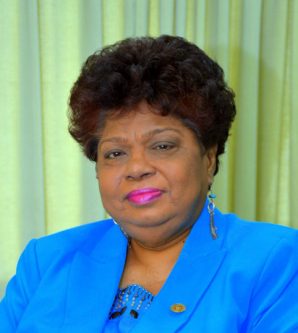New Standard Operating Procedures (SOPs) for handling Trafficking in Persons (TIP) cases are expected to strengthen investigations and prosecutions, while ensuring the protection of victims, according to Minister of Social Protection Amna Ally.
Delivering the feature address on Wednesday at an inception workshop, held to guide the development of the SOPs, Ally noted that the SOPs will help to guide stakeholders and persons associated with the TIP fight to improve efficiency in their efforts to protect victims.
“With so many actors involved in responding to human trafficking in Guyana, the government recognises the value of a standardised and harmonised response. No single stakeholder can effectively combat human trafficking but a coordinated response is only possible when clear and coordinated procedures… are adopted by all stakeholders,” she said.

Ally stressed the need for the successful conviction of offenders and the redress of the grievances of victims as well as the protection of their rights.
She identified extreme poverty, entrenched inequality and a lack of education and opportunities as the root causes of human trafficking, while noting that they must be addressed.
Minister of Public Security Khemraj Ramjattan also spoke at the forum and noted that while the national plan of action for the prevention and response to TIP is being implemented, the workshop is part of continuing efforts to ensure Guyana maintains its Tier 1 status.
“It is a status we have fought hard to achieve and we will fight harder still to maintain,” he stressed, while adding that the combined efforts will benefit the overall fight.
The government, he also assured, is committed to allotting resources and ensuring quality partnerships to fuel local efforts to effectively combat TIP and other crimes.
Towards the implementation of the national plan, he mentioned that there has been training, including training courses for police prosecutors and the training of five officers by Interpol; awareness sessions in secondary schools and major organisations; and surprise inspections of businesses in regions 3, 4, 7 and 8.
The workshop was one of two planned by the International Organisation for Migration (IOM) in collaboration with government. The other is to be held on November 29.
US Ambassador to Guyana Perry Holloway, who also addressed the gathering, said that while the US, which has provided funding to IOM to monitor and combat TIP, is pleased with the collaborative efforts, more work needs to be done.
He agreed that the government has done a lot to address TIP. “Its proactive approach to criminalise human trafficking, train law enforcement and frontline officers, conduct numerous outreach and sensitise campaigns and develop partnerships with NGOs speak to the commitment of the government to eradicate human trafficking within its borders,” he noted.
Holloway said that in this year’s Annual Trafficking in Persons Report, the US State Department concluded that Guyana acknowledges the existence of human trafficking within its borders and is making significant efforts to address this and meets the minimum standards for compliance with the Trafficking Victims Protection Act. He said that it was also noted that government should continue to focus on expanding efforts in the interior and to partner with NGOs to finalise written identification and standard operating procedures.
First Lady Sandra Granger applauded the US for its support in helping Guyana to get rid of the scourge of human trafficking and she too said that government has made strides. “Let us also be conscious that trafficking of human beings… is big business. It is not only girls from the hinterland who have been or are being trafficked for sex work. I have spoken to girls from the coast who have fallen victims…,” she said, while adding that she believes that it is imperative that comprehensive SOPs be developed, widely publicised and implemented so that the scourge could be eliminated from Guyana.
‘Trafficking in human beings is a crime against humanity. Any incidents of this crime must be met with the full might of the law regardless of how much money the perpetrators of their associates use… to buy off the victim or the victim’s family,” she further added.
Linda Eriksson Baca, IOM international consultant, in brief remarks noted that the work being done to combat TIP is important and that a support network for victims need to be created. “Each of us has a role to play in supporting the victim and protecting the victim,” she stressed.
Lori Mann, IOM international consultant, and Robert Natiello, Chief of Mission of IOM, also made brief remarks during the opening ceremony.
A press release from the IOM stated that the national consultative process, which builds on recommendations emanating from a legal and policy review conducted in July to September this year, is expected to lead to the development of seven SOPs designed to improve investigative and prosecution procedures. It added that the development of all SOPs will specifically consider procedures to be adopted in instances of child trafficking in accordance with the fact that in 2015, over 30% of identified victims were minors.
The final SOPs, the release said, will be aligned with international standards and the best practices integrated into specialised training courses aimed at building the capacity of police, prosecutors, criminal judges, magistrates and front line officials from the ministries of Social Protection, Public Security, Natural Resources, Indigenous Affairs and Foreign Affairs, the Customs and Immigration departments, Guyana Geology and Mines Commission and the Guyana Forestry Commission.









